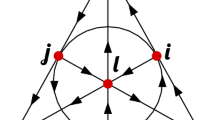Abstract
Let a compact torus \(T=T^{n-1}\) act on an orientable smooth compact manifold \(X=X^{2n}\) effectively, with nonempty finite set of fixed points, and suppose that stabilizers of all points are connected. If \(H^{odd}(X)=0\) and the weights of tangent representation at each fixed point are in general position, we prove that the orbit space \(Q=X/T\) is a homology \((n+1)\)-sphere. If, in addition, \(\pi _1(X)=0\), then Q is homeomorphic to \(S^{n+1}\). We introduce the notion of j-generality of tangent weights of torus action. For any action of \(T^k\) on \(X^{2n}\) with isolated fixed points and \(H^{odd}(X)=0\), we prove that j-generality of weights implies \((j+1)\)-acyclicity of the orbit space Q. This statement generalizes several known results for actions of complexity zero and one. In complexity one, we give a criterion of equivariant formality in terms of the orbit space. In this case, we give a formula expressing Betti numbers of a manifold in terms of certain combinatorial structure that sits in the orbit space.

Similar content being viewed by others
Notes
An almost free action is an action with finite stabilizers. This situation may occur if disconnected stabilizers are allowed for the original action; however, in this case, we take coefficients in \(\mathbb {Q}\). For an almost free action of T on X, we have \(H^*_T(X;\mathbb {Q})\cong H^*(X/T;\mathbb {Q})\).
References
Goresky, M., Kottwitz, R., MacPherson, R.: Equivariant cohomology, Koszul duality, and the localization theorem. Invent. math. 131, 25–83 (1998)
Masuda, M., Panov, T.: On the cohomology of torus manifolds. Osaka J. Math. 43, 711–746 (2006)
Franz, M., Puppe, V.: Exact cohomology sequences with integral coefficients for torus actions. Transformation Groups 12, 65–76 (2007)
Franz, M.: A quotient criterion for syzygies in equivariant cohomology. Transformation Groups 22, 933–965 (2017)
Ayzenberg, A.: Torus actions of complexity one and their local properties. Proceedings of the Steklov Institute of Mathematics 302(1), 16–32 (2018)
Bredon, G.E.: Introduction to compact transformation groups. Pure and Applied Mathematics V.46 (1972)
Smale, S.: Generalized Poincaré’s conjecture in dimensions greater than four. Ann. of Math. 2(74), 391–406 (1961)
Behrens, S., Kalmar, B., Kim, M.H., Powell, M., Ray, A.: The disc embedding theorem. Oxford University Press (2021)
Kleiner, B., Lott, J.: Notes on Perelman’s papers. Geometry and Topology 12, 2587–2855 (2008)
Buchstaber, V.M., Terzić, S.: Topology and geometry of the canonical action of \(T^4\) on the complex Grassmannian \(G_{4,2}\) and the complex projective space \(\mathbb{C} P^5\). Moscow Mathematical Journal 16(2), 237–273 (2016)
Buchstaber, V.M., Terzić, S.: The foundations of (2n, k)-manifolds. Sb. Math. 210(4), 508–549 (2019)
Karshon, Y., Tolman, S.: Topology of complexity one quotients. Pacific Journal of Mathematics 308(2), 333–346 (2020)
Li, H.: \(\pi _1\) of Hamiltonian \(S^1\) manifolds. Proc. of the AMS 131(11), 3579–3582 (2003)
Ayzenberg, A.: Torus action on quaternionic projective plane and related spaces. Arnold Mathematical Journal 7, 243–266 (2021)
Atiyah, M.F.: Elliptic operators and compact groups, LNM 401. Springer, Berlin (1974)
Bredon, G.E.: The free part of a torus action and related numerical equalities. Duke Math. J. 41, 843–854 (1974)
Yang, C.T.: Transformation groups on a homological manifold. Transactions of the AMS 87(2), 261–283 (1958)
Ayzenberg, A., Cherepanov, V.: Torus actions of complexity one in non-general position. Osaka Journal of Mathematics 58(4), 839–853 (2021)
Church, P.T., Lamotke, K.: Almost free actions on manifolds. Bull. Austral. Math. Soc. 10, 177–196 (1974)
Fintushel, R.: Classification of circle actions on 4-manifolds. Trans. Amer. Math. Soc. 242, 377–390 (1978)
Allday, C., Franz, M., Puppe, V.: Equivariant Poincaré-Alexander-Lefschetz duality and the Cohen-Macaulay property, Algebraic & Geometric. Topology 14, 1339–1375 (2014)
E. C. Zeeman, Dihomology III. A generalization of the Poincare duality for manifolds, Proceedings of the London Mathematics Society, V. s3-13:1 (1963), 155–183
Buchstaber, V., Panov, T.: Toric topology, math. Surveys Monogr., 204, AMS, Providence, RI (2015)
Davis, M., Januszkiewicz, T.: Convex polytopes, Coxeter orbifolds and torus actions. Duke Math. J. 62(2), 417–451 (1991)
Acknowledgements
The authors thank the anonymous referees for the numerous valuable comments on the first and second versions of the paper, especially for paying our attention that orientability assumption is required in all statements of the paper and that the reference to Poincaré conjecture in dimension 4 was missing. We also appreciate the advice of the referee to rewrite some arguments in the language of homology with closed supports.
Funding
The article was prepared within the framework of the HSE University Basic Research Program.
Author information
Authors and Affiliations
Corresponding author
Ethics declarations
Conflict of interest
The authors declare no competing interests.
Additional information
Publisher's Note
Springer Nature remains neutral with regard to jurisdictional claims in published maps and institutional affiliations.
The article was prepared within the framework of the HSE University Basic Research Program.
Rights and permissions
Springer Nature or its licensor (e.g. a society or other partner) holds exclusive rights to this article under a publishing agreement with the author(s) or other rightsholder(s); author self-archiving of the accepted manuscript version of this article is solely governed by the terms of such publishing agreement and applicable law.
About this article
Cite this article
Ayzenberg, A., Masuda, M. Orbit Spaces of Equivariantly Formal Torus Actions of Complexity One. Transformation Groups (2023). https://doi.org/10.1007/s00031-023-09822-3
Received:
Accepted:
Published:
DOI: https://doi.org/10.1007/s00031-023-09822-3



